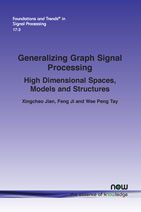Generalizing Graph Signal Processing: High Dimensional Spaces, Models and Structures
By Xingchao Jian, Nanyang Technological University, Singapore, XINGCHAO001@e.ntu.edu.sg | Feng Ji, Nanyang Technological University, Singapore, jifeng@ntu.edu.sg | Wee Peng Tay, Nanyang Technological University, Singapore, wptay@ntu.edu.sg
Abstract
Graph signal processing (GSP) has seen rapid developments in recent years. Since its introduction around ten years ago, we have seen numerous new ideas and practical applications related to the field. In this tutorial, we give an overview of some recent advances in generalizing GSP, with a focus on the extension to high-dimensional spaces, models, and structures. Alongside new frameworks proposed to tackle such problems, many new mathematical tools are being introduced. In the first part of the monograph, we will review traditional GSP, highlight the challenges it faces, and motivate efforts in overcoming such challenges, which will be the theme of the rest of the monograph.
Generalizing Graph Signal Processing: High Dimensional Spaces, Models and Structures
In modern data analysis, massive measurements from a network require novel signal processing techniques, which are expected to be adapted to the network topology, have distributed implementation, and are flexible enough for various applications. Graph signal processing (GSP) theories and techniques are geared towards these goals.
GSP has seen rapid developments in recent years. Since its introduction around ten years ago, we have seen numerous new ideas and practical applications related to the field. In this tutorial, an overview of recent advances in generalizing GSP is presented, with a focus on the extension to high-dimensional spaces, models, and structures. Alongside new frameworks proposed to tackle such problems, many new mathematical tools are introduced.
In the first part of the monograph, traditional GSP is reviewed, challenges that it faces are highlighted, and efforts in overcoming such challenges are motivated. These efforts then become the theme for the rest of the publication. Included are the generalization of GSP to high dimensional vertex signal spaces, the theory of random shift operators and the wide-sense stationary (WSS) statistical signal models, and the treatment of high dimensionality in graph structures and generalized graph-like structures. The monograph concludes with an outline of possible future directions.
